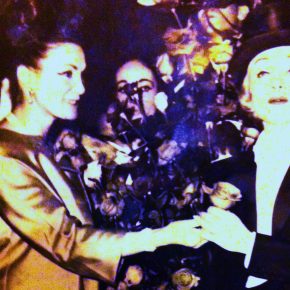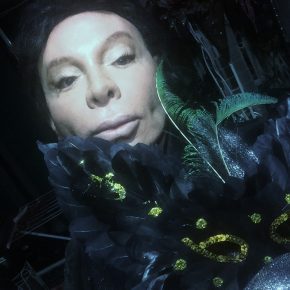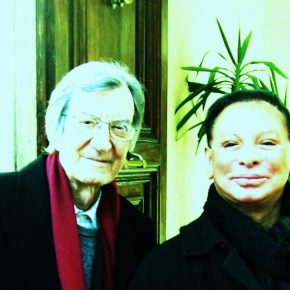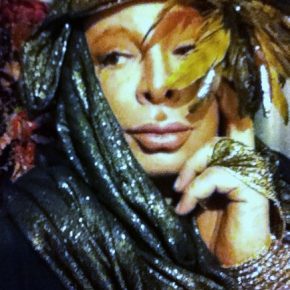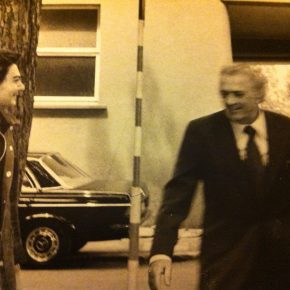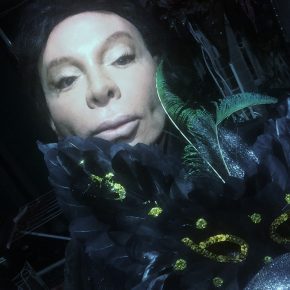- Marlene Dietrich and Wardal
- Maestro Carlo Lizzani & Count Federico Wardal, best cinema & best theatre together
- Verdi Masked Ball Royal Opera
- Fellini and Wardal
- Count Wardal and his favorite mask
Federico Wardal is an Italian playwright, screenplay writer and director and acting instructor. He speaks widely on topics related to human rights and his artistic craft and currently lives in San Francisco.
Cristina:
First off, please introduce yourself! We’ve got an audience from around the world, and not everyone may be familiar with the world of live theater or independent films.
Wardal:
It is not easy to introduce myself as Wardal, as I consider Wardal a “faceted character” due to the influences of the Nobel Prize-winner Pirandello, Einstein and my mentor Federico Fellini.
To be more clear, I could consider [my persona] Wardal an invented imaginary author, arising out of the ideas of the ancient authors from Greece, Pirandello, and his friend Einstein. I love Einstein’s theory of relativity and think Fellini was inspired by Pirandello and Einstein when he created his film “8 1/2.”
From the first time I appeared on the stage as Wardal at the age of 14 years old, my aspect was (and is) an artifact, built up, never natural or simple, and sensational and amazing.
Despite the nature of my creation, one maxim gave me the natural, appropriate physical structure to assume while on the stage: “Le fisique du role.”
Everywhere in the world the attention was and is on my appearance. So, everybody formulates an ideal image of myself in their mind, but…but when, step by step, by what I conceive as an “accurate strategy,” my essence shows itself, everybody becomes surprised, sometimes shocked. What the audience imagines that I could look like often does not match with their experience of my essence on stage.
At the beginning they may think I am “something“ rather than “someone,” a mannequin without essence or soul. When my soul comes through it “kills” that preconception of my aspect. All becomes “a coup de theater“ and the real show starts and continues from there.
The game, my game is playing on the ambiguity: “to seem or to be.”
This serves me well in theatre, being that theatre is based on ambiguity…
The first revolution I caused was in Italy, when during a tour of the nation’s large stadiums and big town squares, I appeared as Wardal. At 16 years old, wearing sophisticated costumes, I read Black Power poems against racism, played the soul of black people through a Southern Italian white-brown skin…
In January 2017 he appeared on the television show Planet Glee and said, during a discussion of Pirandello’s work:
“I am not an actor, a person neither, I am a character.“ What does it mean to be a character? It is an invention, a creation, which many people believe to be without soul, but a character, as anyone else who is created, comes with a soul.”
Cristina:
You mention that a strong aspect of your work involves bringing the ancient arts together with the most modern. What attracts you about both ancient Greek-era theater and modern productions, and why do you seek to integrate them?
Wardal :
The soul of theatre is especially present in the ancient Greek dramas.
Even the most modern dramatic works by the Nobel Prize winner Pirandello and by my friend Judith Malina from NYC (who surely also deserves a Nobel Prize) are affected by the ancient Greek dramas. Being inspired eternally by theatre I count myself in that category as well.
When I act, in any play, ancient or modern, whether assisted by the most advanced technology or only by my unamplified voice and some candles, where do I get the energy that my audience likes?
From the bowels of the earth and cosmos. I mean, I reach that timeless energy , I remove the infrastructure of the eras (going from the present to the past and more…) and straight to the light, the essence, yes as a magician, a medium, a psychic. To do that I use a special kind of concentration: “The Wardal`s Concentration.”
It’s easy for me to be naturally connected with the cosmic energies that often tell me about the future of humanity.
When I started to take drama lessons, it was just after the cultural change of the sixties and the sexual revolution and youth needed fresh air far away from their parents and their old and boring world. It was the time of the disco clubs where finally people could choose dance partners regardless of their sex or gender.
Also theatre was affected and ‘contaminated’ in a way by this tendency to breathe new air into life and change things. I played characters from and studied Mayakovski, Mrozek, Beckett, Ionesco, Genet…The rest was considered “old”….but penetrating further into drama, I discovered that all those great authors who talked about the absurdity of the modern life and its human protagonists, took energy from the ancient theatre, the ‘mother’ of the modern theatre. I started immediately to study the Greek tragedies, seeing them as prophetic for humankind. Wardal is surely the fruit of this ancient-modern combination, also retaining an air of mystery….
Cristina:
What is a ‘Human Rights’ drama, and how is it a separate form of theater? Many art works speak out about justice in different ways, what makes your productions a new genre?
Wardal:
“From the ancient time towards the future ever” .
As I said, from the very beginning of my artistic career I faced up to themes such as racism, gender equality, and human and civil rights. Never have I considered my work ‘political’ but ‘human’ instead, something everybody can understand.
As with my mentors Federico Fellini and Carlo Lizzani, I was never interested in getting a degree in drama or film, but I chose the best teachers of my time. They agreed with me that nobody could learn theatre or film in academies or universities. Only by living our own lives deeply, facing the hard truths, can teach us to be authentic ‘stage animals’ in any form of art. True art is a form of giving birth and to give birth one has to suffer….
I faced life as an “Elephant Man” since I was five years old. As I said, I was considered special and unusual by many people. And not only for my appearance , but also by my way of being open to everybody, every culture, every race ….My country, Italy, at that time created many obstacles for me because of my characteristics, although during that time, step by step, I became an icon of freedom for Italian youth.
I know personally the meaning and value of human rights. I know it by the deep wounds in my soul…So, I wrote a manifesto about human rights to go along with my performance and visual art. And I included this line: “Every artist can produce human rights-related drama or film, but only the artist who feels the meaning of injustice in his soul through personal experience can reach an audience.” It is not just a concept but a reality.
When at 16 years old I read in front of thousands of people in the stadiums of Italy a poem about the black people of the United States, the applause was unending. Although that tour was mostly about minimalist songs sung by popular Italian stars, everybody understood what I meant and was riveted to every comma, every pause, every syllable of that Langston Hughes poem: “well, son, I will tell u : my life was not a crystal staircase…There were nails and splinters on the landings…but ever I continued to go up and I turned corners where there was no glimmer of light. So son, do not stop on the steps because is hard to proceed, do not fall now, my love, because I continue to go up and the life for me was not a crystal staircase.“
I reached many millions of people through that tour who understood me perfectly, especially in Southern Italy, at that time victims of racism by Northern Italy.
The best technique to write, direct and play the human rights drama or other visual performing art is just to put pauses and points exactly when the wound is most painful. The violation of human rights always gets felt in the soul. This soul violation can happen to not just one person, but often the people of entire countries. So I made a serial of short movies about a person, an hero, one of my most beloved people, Jose Rizal.
The story is that a few years ago I was violated again in my soul and I met by coincidence an ambassador who reminds me of the hero of his country, the Philippines. Jose` Rizal wrote a poem, an irresistible poem, “Last Farewell,” at 35 years old, three hours before he was to be executed by the occupying Spanish army. Is it not weird to write a poem, knowing that you will be killed in three hours?
Of course that poem is a manifesto of freedom and independence, the main life goal of the incredible Jose` Rizal. That poem shows his wounds and the wound of each Filipino at the hands of the Spanish colonizers.
The three short movies I made about Rizal are based on that poem that I read out loud in Italian, English, Arabic, Spanish (Rizal wrote that poem in Spanish ) …making three different versions illustrating his grief in various languages….I mean in the universal language of who need freedom. Of course the human rights themes of drama-visual performing art pieces must be expressed through appropriate stories, but the secret is to show the substance and the essence of those stories through the intensity of a small gesture, a quick glance that those who notice can understand….I made short movies about other heroes who stood for freedom and independence : Garibaldi, Gandhi, Mandela, but also about September 11th, Gabriel Garcia Marques. The next will be about Simon Bolivar.
Marlene Dietrich, the immortal legend, requested to meet me, because she read about my “special” shows about racism when I was so young in front of thousands of people.
We spoke about a project to do together, of course about Human Rights! Her charisma and beauty was what God wished to create….
Her soul-feeling about human rights was harder than iron.
“To appear and to be” …is my watchword too….A collage splicing together special scenes from both mine and her films about human rights could be my next project.
Cristina:
Do you have a particular, individual aesthetic in terms of how you do plays? How would you describe your own style?
Wardal:
My aesthetic when I play roles and and appear on stage? Very simple: I start with Diderot and I become Stanislavski, lol!
Those two icons could represent the two opposite ways to perform. Diderot says that a performer must never give into emotion but to Stanislavski a performer could get caught up in feeling, especially if they have experienced the emotion previously.
Although in all this, I calculate time to spend on any one emotion by the rhythm of the whole play or film, its pauses and lines. Anyway, for people not so familiar with acting, the process of performing on stage also involves going back over emotions and reliving them in real time. While doing that, an actor is often dangerously distant from his own life. When I go to act, in theatre, film, TV….I relax myself for about half an hour to get distance from my daily life. Our law in theatre, film, TV is that we must perform anyway, the show must go on. Performing is a sacred act, we can`t say no to it for any reason. Some actors died to themselves on the stage…it is a paradox, but it is true. The great Paola Borboni, Pirandello`s promoter, who was in his nineties and was experiencing memory loss, still went on the stage. ….But he was the incredible Paola Borboni! Whether you have memory or not, you must be the soul of the show and only a genius-level show has a soul…..
On stage I am only Wardal, never Federico.
The soul of the audience is one, and only Wardal can communicate with it, being Wardal allows me to reach everybody.
Wardal allows to be sometimes like Hamlet, other times like Euripides, Sophocles, Aeschylus, Beckett, Ionesco, Genet, Pirandello’s characters…I am not as I am, I will be the character of the play, but always I am Wardal who allows them to be, to appear as a different person. As I said, I am first Diderot and then Stanislavski…lol!!
Cristina:
What do you admire most about Fellini’s cinema? How do you think that a live theater artist can learn from a filmmaker?
Wardal:
Fellini? Luca Fava recently wrote a big drama for me, a monologue entitled ‘Federico and Fellini” focused on my very special connection with Fellini. Somebody said that I was Fellini’s last muse. Another person said that Fellini was looking for me in vain….The opposite of Pirandello where the characters look for their author!
Yes, for Fellini it was the opposite…He continues looking for me after his death….lol!
I cannot forget the first time I met Fellini. Yes we had friends in common, but that was not the reason he wanted to meet me. Fellini is Fellini. He never made his choices because of anybody else!
Fellini needed Wardal. (At that time my name was not Wardal, but only Federico.) All the doors of Cinecitta` (The city of cinema) in Rome became open to me because Fellini requested to see me. The hall of his studio at Teatro 5 was full of celebrities, but Maurizio Main, his Assistant Director, and Norma Giacchero, his main editor, put out a special red carpet for me to see my idol Fellini and the miracle was accomplished! And when I saw him….my eyes reflected in his eyes and his eyes in my eyes during the meeting, just as I had dreamed the day before. A magical , incomparable meeting. When he saw me, he recognized that I was exactly the character he was looking for. Not a character for one of his films (he was working on Casanova at that time), but a character created for all his films…
This is wonderful, it rarely happens in the universe, but at the same time, it was one of the worse dramas of my life. My father was strongly against that meeting. My father was a powerful lawyer and politician, but nothing, nobody, ever could stop Fellini and his will. So, my father, in order to win, because it was impossible to destroy Fellini, tried instead to destroy me by sophisticated strategies until I got depressed and disappeared from everybody.
Fellini was looking for me to take part in his films And the ship goes, The city of the women, Orchestra`s Rehearsals, but myself, my normal self as Federico, was unreachable….This is my story with Fellini, I hope, which will soon be produced. Film archives must have copies. This is a short sequence of it.
I started already to celebrate Fellini’s 100th anniversary. What do I think artistically about Fellini? He has the same kind of genius as Marconi, Einstein, Pirandello, a genius very familiar to me. His imaginary world had different dimensions, different floors. Like me, in his way, he was a theatrical filmmaker. Mayakovski said, “Theatre is not a mirror that reflects, but a mirror to enlarge.” Films do not need to enlarge reality because they are already enlarged, but Fellini still enlarges the world, escalating into different dimensions, exploring and observing fantasy through fantasy (Theatre in the theatre), cinema seen through cinema, as in Fellini eight and a half.
….Fellini sees Fellini, as Wardal allows Wardal existence….
When I worked with another legendary film script writer, Carlo Lizzani, my other mentor, I changed the way I act…I was more dry, direct, a realist as in the Neorealist film movement created by Rossellini, De Sica, and Lizzani during Fellini’s time. But I never in any way betrayed Fellini, as he gave me the world. I am Fellini`s artistic son, and I may be the last one.
Oh how much this unique kind of experience gave me! On the other hand I am proud to have started in drama facing a live audience. When I act in film, an imaginary audience is always in front of me in my mind’s eye. I know very well what it means to perform for an audience. This helps me in film, visual art and theater.
In contrast, even famous luminaries such as Sophia Loren were born into the world of film acting and not theater and did not benefit from this mixture of experience. However, Anna Magnani, a legend in Rosselini’s Rome’s Open Town, studied drama, not only films, and this knowledge comes through in her performance.
Anna Magnani was sublime in Cocteau’s montage film The Human Voice, directed by Rossellini. Sophia Loren was interested in drama and cultivated her friendship with worldwide theatre symbol Eduardo De Filippo, whom, of course, I followed and met several times. In 2013 Sophia Loren acted in The Human Voice, a worldwide success. Sophia was never a victim of her beauty, and I never was a victim of my appearance: my soul communicated with the soul of my global audience. I have a dream to act in a film called Could Distance, a modern story similar to the plot of The Human Voice.
Both the stories are experienced through telephone, but in Could Distance the plot wrinkle is that two people go through their love story with the same person via telephone without knowing.
When I work on films I always say, “I am privileged, I started with theatre.”
What can a live theatre artist learn from a filmmaker? How to represent the fantasy when the fantasy and the dimensions of space and time have no limits? How to see behind the words of the script, how to see the imagination…I think that with the invention of the film, the representation of human life in drama became complete, where before it was only limited to the theatre’s physical space. After Fellini and Lizzani I worked with young filmmakers who, while they did not have a drama background, were still very intuitive and special. It was a perfect union between my lengthy experience and their fresh, interesting, intense creativity.
Cristina:
How are you an ambassador for peace through your work?
Wardal:
Young people like to expand their freedom, exploring new worlds and dimensions. Always in my work I hope to give my humble contribution towards understanding, dialogue, and peace. I would never want to be involved in theatre, film, video, or television with commercial purposes, trying to manipulate the audience by offering superficial stories that leave them brainwashed. I only work with people who are talented and who feel responsible to make sure that everything the media presents to the public, through theatre, cinema, TV, or the Internet is designed to help people to recognize their mistakes and improve society and to give a positive vision to the world and the universe. Even comedies do not have to be stupid, but can be extremely helpful for the people who, like children, are attracted to humor. People are not stupid and when shown true art and positive messages, they can improve themselves and how they understand and communicate with themselves and others. This is my role as an Ambassador for Peace.
Cristina:
Do you think that the arts have power to make a literal change in the world, or are they more for comfort and inspiration?
Wardal:
Art has incredible power in the world as demonstrated through history. The world of ideas, inspiration, creativity, invention all comes to us through art. Without the world of ideas we could not survive as a civilization, and that is why art means food, nourishing food. My ancestor queen Cleopatra VII focused her energies promoting the legendary Bibliotheca Alexandrina (Alexandria Library), a repository of human knowledge and art. I also belong to the society of the New Bibliotheca Alexandrina UNESCO, dedicated to restoring and building a new lighthouse for humanity.
Cristina:
Please share some stories of people you’ve met, productions you’ve created, concepts you’ve developed, etc.
Wardal:
During my life I had the privilege to meet legends, crossing continents and eras. This was my wish, to offer to my audience the knowledge that those people gave me through their unique experiences.
I was and I am especially privileged because I met, and I continue to meet, people who are not famous legends but who still gave me their heart, their love, and their huge knowledge. There are no common people in my life or in my career, only real people.
The stories I am writing are only for real people, whether famous legends or not. One recent experience of mine illustrates this.
In 1981 I met Frank Sinatra many years ago in a restaurant in NYC through Marlene Dietrich. Close to that restaurant, a poor man stood singing “My Way“ and begging for some charity.
The man was so immersed in his difficult situation, did not recognize Sinatra. Sinatra and I went inside the restaurant while the poor man stayed outside.
On Dec 11, 2015, I was the guest star at Sinatra’s 100 San Francisco world event. I sung “My Way“ in my own way and I was acclaimed by the audience. Then I rushed to Rome the next day. In the metro I was thinking over the great personal success I had in SF, appearing alongside Frank Sinatra.
Then, another poor man singing “ My Way” came aboard the train, asking listeners to toss him change. My first instinct was to film that man and create a short movie about this extraordinary coincidence. The poor man in Rome was very similar to the poor man in NYC I saw 36 years ago. Then, I said to myself, Federico, you will not film him, but you must just give him some money and then do a short movie about that weird coincidence .”
Now the short movie is nearly done in Egypt and entitled The applause is not for me (But for the poor man). I’ve written many stories for movies and theatre and all are infused with the feeling of my heart and my soul especially towards people…all people.
Cristina:
Is your work received differently in Italy versus San Francisco or anywhere else?
Wardal:
To have more effective communication with my audience I play and sing in different languages.
Every language contains and reflects the thoughts of a specific culture, history, and tradition. That’s why, when I play or sing the same drama or song in different languages, I automatically create very different versions using different gestures, tones, movement and so on.
(Link to the prologue by the official ancient Roman Poet Horace about his contemporary Queen Cleopatra VII, in the same time in English, Arabic, Italian, in Berkeley 2014.)
It is just as when one loves a person: to better communicate, we often try to use forms of expression familiar to the other party.
I started to be known in the Arab world at the beginning of the 1990s and created this.
Egypt opened to me the doors of the Arab world, and I then headed to Iraq, Jordan, and Tunisia. No ‘foreigners’ are famous there. My friend legend Dalida and I are exceptions.
There, I produced this piece, and then this one.
In Latin America I am very welcome too and in Europe, especially in France and UK. In Italy, the country where I was born, I am considered a non-Italian, as I live in San Francisco now, so they welcome me as a foreigner lol! New York City and California are the main cities where I work.
Recently I was the protagonist of Mario Fratti’s Terrorist. Fratti is the very popular script writer for the film Nine about Fellini, winner of four Tony awards. Loren appeared recently in the USA version of Nine, inspired by Fratti`s work.
The first time I acted live in California in 2008 I got a standing ovation. It was in Berkeley through my one man show Rome, Baghdad, Berkeley : Divine Wardal to the court to the poet Dario Bellezza. It was about my artistic collaboration and friendship with the great poet Dario Bellezza, close friend of Pasolini and Judith Malina. The finale of the show was very theatrical. I mean, there was a real finale, but the audience thought it was just a transition scene and so hesitated to applaud.
Anyway it is clear that the audience everywhere is childlike, hearing as a child only the language of the heart and the soul.
I will also tell you about the night that I was the writer and director of a play about one idol of the Inca region (Peru, Argentina, Uruguay, Paraguay, Chile…) the poet and cantor Atahualpa Yupanqui performed in Buenos Aires and Rome and alongside Lawrence Ferlinghetti, the poet legend of SF!
In 2015 I was the headliner of a big event at the SF Italian Cultural Institute with a performance inspired by Ferlinghetti and our friends Dario Bellezza and Judith Malina. We were making a short movie to go along with the release of the book Ferlinghetti 50 poems, Milani 50 images..
Another sensational event for me was in 1996 when I won the worldwide festival in Babylonia (Iraq). H. E. Tarek Abdel Aziz gave me a prize from Saddam Hussein, a huge ruby with words from the Koran engraved on it. It was really weird accepting that, considering that my home country of Italy and my adopted countries of the United States and Egypt were enemies of Saddam Hussein at that time. RAI Tv , the national Italian television station, helped sick children in Iraq by giving them medicine.

